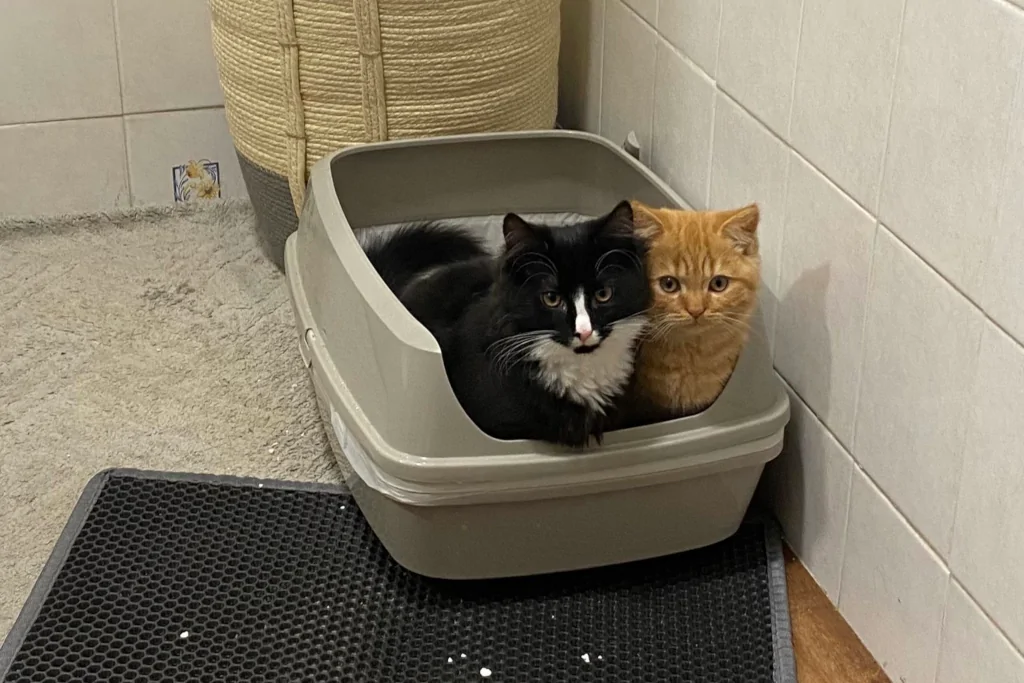Disclosure: We may earn a commission from helpful, relevant links in our content. No cost to you. See our privacy policy.
Adopting an adult cat can be a joy, but what if your new feline friend isn’t litter trained?
The thought of cleaning up messes and dealing with accidents can be overwhelming for any cat owner. Fear not! We have your back with expert tips to help your adult cat learn to love the litter box.
In this blog post, you’ll learn how to turn litter box training into a positive and rewarding experience for both you and your feline companion.
For kittens, follow kitten litter box training guide.

Is It Too Late to Litterbox-Train an Adult Cat?
Good news! It’s never too late to litterbox-train an adult cat.
While adult cats may take a little more time and patience compared to kittens, they can still learn to use the litter box with the right techniques and encouragement.
The key to success is understanding your cat’s behavior, adapting your approach, and remaining consistent in your training efforts.
Techniques for Adult Cat Litter Box Training
Choose the Right Litter Box and Location
Select a litter box that’s large enough for your adult cat to move around comfortably, and place it in a quiet, low-traffic area of your home. Avoid placing it near their food and water or in noisy, crowded spaces that may cause stress.
Select the Appropriate Cat Litter
Experiment with different types of litter to find the one your cat prefers. Unscented, clumping litter is a popular choice, as it’s easy to clean and less likely to cause irritation.
Dr. Elsey’s Ultra litter is of this type, and it’s one of the best choices you could make. You can also try natural alternatives like wood or corn-based products.
Gradually Introduce the Litter Box
Allow your cat to explore and sniff the litter box at their own pace. Some cats may require a gradual introduction, such as placing a small amount of used litter from their previous box into the new one to make it more familiar.
Establish a Consistent Cleaning Routine
Clean the litter box regularly to encourage your cat to use it. Scoop out waste daily and replace the litter entirely every week or two.
Keeping the box clean will make it more appealing and reduce the chances of your cat seeking alternative spots.
Praise and Reward Good Behavior
When you see your cat using the litter box correctly, offer praise and treats as positive reinforcement. This will help build a strong association between the litter box and a rewarding experience.
Monitor Your Cat’s Progress
Keep an eye on your cat’s progress and adjust your approach as needed.
If you notice any setbacks or ongoing issues, consult your veterinarian to rule out any underlying health concerns that may be contributing to the problem.
Addressing Setbacks: Dealing With Accidents
Accidents can happen during the litter box training process, even with adult cats. Try to address these setbacks patiently and calmly to help your cat get back on track.
Here are some practical recommendations for dealing with accidents:
- Clean up accidents promptly. As soon as you discover an accident, clean the area thoroughly with an enzyme-based cleaner to eliminate odors. Cats have a keen sense of smell and may return to the same spot if any lingering scent remains.
- Reassess the litter box situation. If your cat is having frequent accidents, double-check the litter box setup. Ensure it’s clean, easily accessible, and in a suitable location. Also, consider offering additional litter boxes in different areas of your home.
- Identify possible stressors. Stress can lead to accidents, so pay attention to any changes in your cat’s environment that might be causing anxiety. For example, I once rearranged my living room furniture, and my cat started having accidents. After realizing that moving his litter box to a more private area helped, the accidents stopped.
- Consult your veterinarian. If accidents continue despite your efforts, you should consult your veterinarian to rule out any medical issues that may be causing the problem.
Check out our other guide for more tips on troubleshooting litter box issues. Remember, you must try to be patient when dealing with accidents during the litter box training process. Stay positive, and with time and persistence, your adult cat will develop good litter box habits.
Reinforcing Good Habits With Praise and Consistency
To help your adult cat develop and maintain good litter box habits, you need to reinforce positive behavior and maintain a consistent routine. Here are some practical tips to help you out:
- Praise your cat. When you notice your cat using the litter box correctly, gently praise them with an affectionate tone and offer a small treat. This will help them associate the litter box with positive experiences.
- Keep a consistent routine. Cats thrive on routine, so try to maintain a consistent schedule for feeding, playtime, and cleaning the litter box. This predictability helps cats feel secure and can improve their litter box habits.
- Create a comfortable environment. Make your cat’s litter box area cozy and secure, including adding a familiar blanket or toy. A relaxed environment encourages consistent litter box use.
- Use a calming diffuser or spray. Consider a cat-specific calming pheromone diffuser or spray, such as Feliway, to create a soothing atmosphere around the litter box, making it more inviting.
- Track your cat’s litter box behavior. Keep a log of when your cat uses the litter box and when accidents happen, allowing you to identify patterns, triggers, and improvements over time.
- Be patient. Adjusting to new habits takes time, so be patient and understanding with your cat. For example, when I introduced a new type of litter to my cat Smokey, he initially hesitated to use the litter box. With patience, gentle encouragement, and some treats as positive reinforcement, he eventually adapted to the change.
FAQs
Can adult cats be trained to use a new type of litter?
Yes, adult cats can adapt to a new type of litter, but it may take time and patience. Gradually mix the new litter with the old one to help your cat adjust more easily.
How can I encourage my adult cat to use a different litter box?
Place the new litter box near the old one, and gradually move it to the desired location. Additionally, make sure the new box is clean, comfortable, and easily accessible.
Is it harder to litter train an adult cat compared to a kitten?
Adult cats may take longer to adapt to new habits, but with patience, consistency, and positive reinforcement, they can be successfully litter trained.
Can I train my adult cat to use an outdoor litter box?
Yes, adult cats can be trained to use an outdoor litter box. Gradually move the indoor box closer to the door and eventually outside, maintaining cleanliness and accessibility throughout the process.
Alex, a passionate animal lover, has experience in training and understanding animal behavior. As a proud pet parent to two dogs and three cats, he founded AnimalReport.net to share insights from animal experts and expand his knowledge of the animal kingdom.




